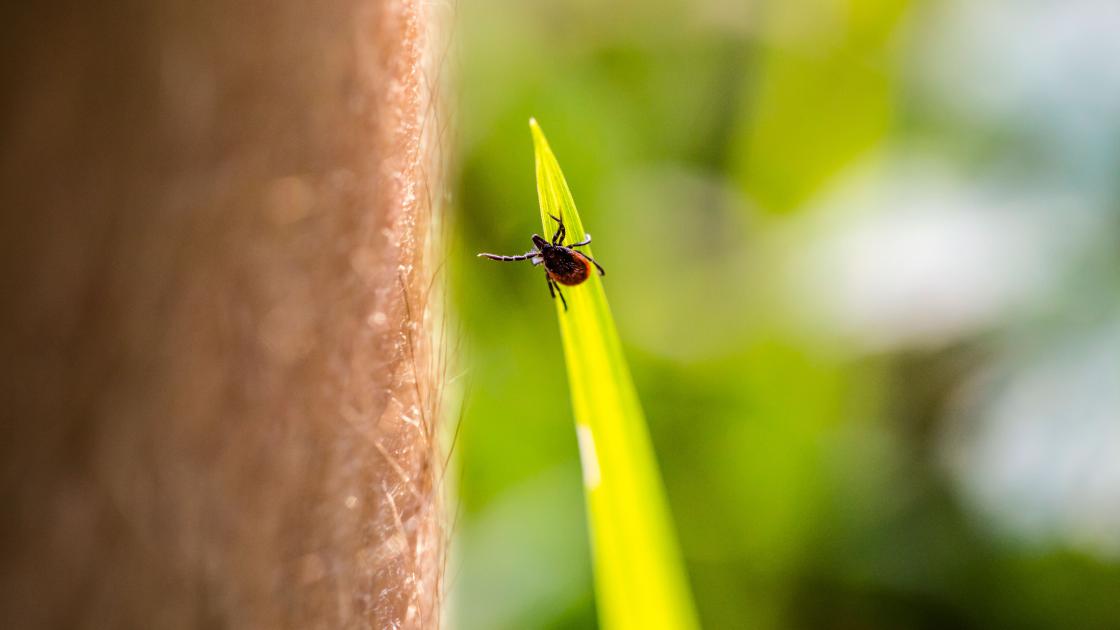
The season is thick with ticks
As the tick population steadily rises, so does the opportunity to become bitten by one of these creepy crawlers. It's important to take precautions to avoid the diseases a tick can carry while outdoors enjoying nature more frequently during warm weather months. Lyme disease is especially one to be aware of and is the most prevalent vector-borne illness in the United States.
The American dog tick, or hard tick, is the most common type of tick in central Illinois. A bite from this little arachnid (that’s right, ticks fall into the same category as spiders!) can lead to Rocky Mountain spotted fever, tularemia and possibly ehrlichiosis in humans. The deer tick, or blacklegged tick, can carry the bacteria that causes Lyme disease. Additionally, there's been a significant increase in lone star ticks recently. These ticks can cause hives, stomach cramps, difficulty breathing, fainting and even death. They could also really wreck your barbecue—lone star ticks can cause a severe allergy to meat.
Many ticks are most active from April through June. “When it comes to tickborne diseases, we are very fortunate to be living in the era of awareness,” says Dr. Vidhya Prakash, CMO and an infectious diseases specialist at SIU School of Medicine. “While almost all of these infections are treatable with appropriate therapy, prevention is key to combatting disease.”
As you head outdoors this summer, SIU physicians recommend taking these preventative measures:
- Wear long pants and long sleeves to prevent ticks from attaching to your skin.
- Wear light-colored clothing so you can easily spot a tick on yourself.
- Avoid high grass, wooded or brushy areas.
- Walk in the center of trails.
- Use insect repellent containing 20-30% DEET or other EPA-approved active ingredients on exposed skin and clothing.
- Apply products that contain permethrin to clothing. The CDC recommends treating all clothing and gear, including boots, pants, socks and tents, with products containing 0.5% permethrin. One treatment will continue to protect even after several washings.
While taking these precautions is a good start, experts also recommend doing a thorough check after coming indoors.
- Scrub up in the shower or bathtub, preferably within two hours of being outside.
- Perform a full-body tick check on yourself using a handheld or full-length mirror. Parents should also check their children.
- Check areas like the scalp, neck, armpits, groin, between the legs, behind the knees, in and around the ears, inside the belly button and around the waist.
- Check out your gear and pets. While you may not find any ticks during your full-body check, the little pests could hitch a ride on your gear or canine companion and attach to you later.
- Throw your clothes in the dryer on high heat for an hour to kill remaining ticks.
What should you do if you find a tick on your clothes, or worse, on your skin?
- You can remove ticks found crawling on your clothes with tape. Just make a ring of tape around your hand (sticky side out, attach the ends) and the critters will stick to the tape. You can then fold over the tape and place it in the trash.
- Remove any tick found on your body ASAP!
- Grasp the tick firmly with tweezers and pull it (gently, but firmly) straight out.
- If you don’t have tweezers, use a piece of tissue. Never use your bare hands since the secretions from the tick can cause disease.
- Dispose of the tick by flushing it down the toilet. You can also stick it to tape and throw the tape away in the garbage.
- Wash your hands and the bite site with soap and water.
- Ticks attached to your skin for at least 24-48 hours are more likely to transmit diseases. Be mindful of your health and call your physician if you experience symptoms like a rash or unexplained fever.
Source: IDPH



